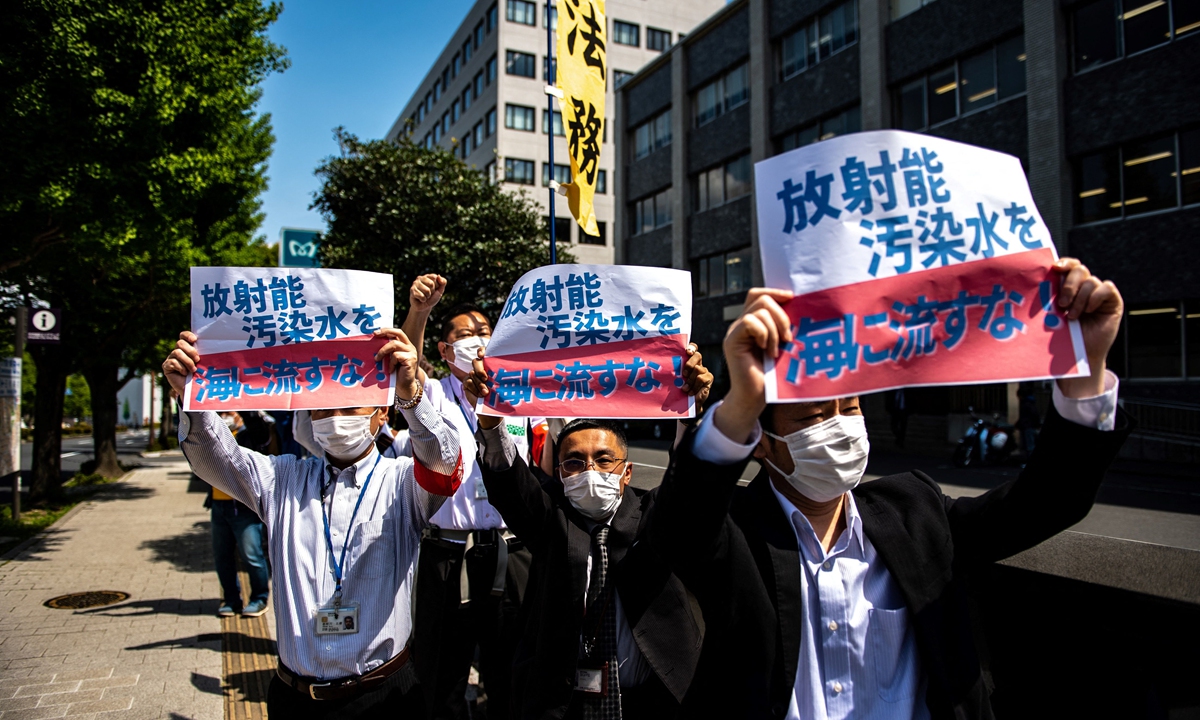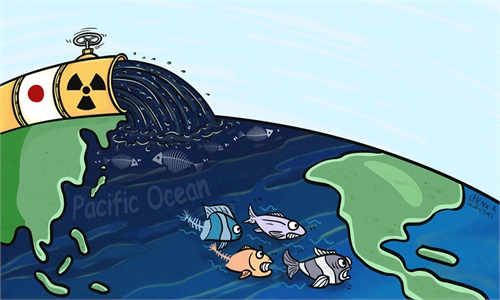Japan should face up to responsibility, reality over Fukushima wastewater dumping: Japanese nuclear experts

Activists take part in a protest against the Japan government's plan to release treated water from the stricken Fukushima nuclear plant into the sea, outside the prime minister's office in Tokyo on April 12, 2021.Photo: VCG
Editor's Note:
Japan's plan to dump nuclear-contaminated wastewater into the ocean has been strongly condemned by the international community. Nonetheless, Tokyo is still going its own way and speeding up the plan to make the rest of the world pay for it. What harm will Japan's action bring in terms of the environment and international relations? What should relevant parties do to prevent the selfish act of Japan? Global Times (GT) reporters Wang Wenwen and Xia Wenxin discussed these issues with Hajime Matsukubo (Matsukubo), secretary general of the Tokyo-based Citizens' Nuclear Information Center (CNIC), and Hideyuki Ban (Ban), a Japanese nuclear expert and co-director of the CNIC, respectively.
This is the third piece of the series.
GT: How strong is the opposition in Japanese society to Japan's decision to dump nuclear-contaminated water in the Pacific Ocean? What are your concerns over this matter?
Ban: 42 persons among 44 were against releasing contaminated water to the Pacific Ocean in a public hearing that Ministry of Economy, Trade and Industry (METI) organized in August 2018. Participants like the leaders of tourist organizations, of agriculture organizations and of forestry organizations around Fukushima prefecture in public hearings held by METI all expressed opposition to the release plan or expressed serious concern about potential damages.
Nearly 60 percent of the mayors of 42 municipalities in Iwate, Miyagi and Fukushima prefectures opposed the planned discharge of accumulated water from the stricken Fukushima No. 1 nuclear power plant, an Asahi Shimbun survey showed in 2021.
Citizen's groups like FoE-Japan, CNIC, Greenpeace Japan and other organizations are also against the release plan.
Japan Fisheries Co-operative, a nationwide organization of fisheries and Fukushima Fisheries Co-operative exchanged a document with TEPCO that promised "No release without agreement" and fishery workers maintain their strong opposition. Fisheries Co-operative of Miyagi prefecture and Ibaragi prefecture also expressed opposition.
Matsukubo: Unfortunately, opposition within Japan has decreased recently since the government and TEPCO (Tokyo Electric Power Company) did an intensive ocean discharge campaign.
Based on Asahi Shimbun opinion poll, 55 percent opposed the discharge in 2021, but in 2023, 41 percent now oppose and 51 percent support the idea.
TEPCO said it will reduce radionuclide from contaminated water by the Advanced Liquid Processing System (ALPS). But some of them remain in the water.
We propose long-term storage since IAEA's basic principle for managing radioactive waste is enrichment and centralized management.
GT: Is there a more scientific and safe alternative to dumping nuclear-contaminated wastewater into the ocean?
Matsukubo: Even after treatment by ALPS, the treated water contains various radionuclides. However, it is certain that the major nuclide is tritium.
The half-life of tritium is about 12 years, and after about 120 years of storage, tritium will decrease to about 1/1000 of its current level. Therefore, long-term storage will greatly reduce the concern of environmental contamination.
There are several storage options. One is tank storage, which raises concerns of treated water flowing into the ocean in the event of some accident. The other is concrete solidification, which avoids spillage by solidifying the treated water with concrete.
Ban: Firstly, TEPCO should stop groundwater from entering into the reactor buildings. The company constructed an ice wall around them but it doesn't work adequately. So, contaminated water increases and they need more tanks for storing contaminated water.
Secondly, contaminated water in tanks which is over the safety regulation should be treated again by ALPS for reducing radioactive materials except tritium.
Thirdly, the treated water should be solidified with mortar.
TEPCO can carry out all these steps by using current technologies.
GT: According to some Japanese media, part of the equipment related to the discharge of nuclear-contaminated water from the Fukushima Daiichi nuclear power plant started operation on March 17. Why did Japan stick to its discharge plan despite domestic and international opposition?
Matsukubo: Since it already decided, and it was the cheapest way to deal with this issue. Also as it stuck to this policy, they lost time to consider other options.
However, this is also a matter of international reputation, and I do not believe that decisions should be made solely on the basis of economic efficiency.
Ban: When the disaster occurred in 2011, then the Fukushima governor agreed to take the waste facility after Tokyo said it would promised to take the waste out of the prefecture after 30 years. .
Almost all experts, including the Atomic Energy Society of Japan, recognize that it's impossible to dismantle Fukushima Daiichi within 30 years.
But Japanese government and TEPCO have to keep the promise because they strongly promoted nuclear power and as a result caused severe damage to the people of Fukushima.
GT: Some argue that if the discharge of nuclear-contaminated wastewater begins, Japan will become a sinner of humanity and history. What's your take on this?
Ban: Of course it's not just Japan that is dumping toxic waste, including that from nuclear power plants, into the environment. We have seen the results of this global mentality with the large-scale environmental problems that the planet is now facing. But this definitely does not excuse Japan, which was responsible for one of the world's worst nuclear accidents. I believe Japan should face up to this responsibility and this reality instead of simply making the problems "out of sight, out of mind." The Japanese authorities should also listen more sincerely to people who will be directly affected as well as the international voices, including the alternatives that have been proposed.
GT: Japan itself was a victim of a nuclear disaster. Why didn't it learn its lesson and still decide to discharge nuclear-contaminated water?
Ban: This is a very good question! I too wish that the Japanese government and nuclear industry would learn the lessons of the TEPCO Fukushima Daiichi nuclear disaster. As I mentioned above, no one has really taken responsibility for this disaster and all their actions are to cover up and hope people forget.
GT: So far, we have not heard official voices from the US or the West opposing Japan's decision. Do you take it as an encouragement or tacit approval for Japan's release plan?
Matsukubo: Now the Japanese government is coordinating with other countries to include language at the G7 summit that "welcomes a transparent process for release."
Ban: I think the US and the West hardly make some announcement of opposition or concern because no visible damage will appear in near future. Radiation can definitely damage the DNA or body of living creatures, but it's very difficult to get the proof of relationship between exposure to radiation and damage.
GT: What actions do you and your organization plan to take in response to the Japanese government's plan?
Ban: CNIC together with other organizations I mentioned above have taken actions like collecting signatures against the release and making demands to reverse the plan to METI, some gatherings, press conferences and webinars etc. In April, I, together with the Diet Members who are anti-nuclear, am planning a dialogue with METI.
GT: What else do you think should Japan's neighbors, such as China and South Korea, the United Nations, and relevant international organizations, do to stop Tokyo's dumping?
Matsukubo: The Pacific Islands Forum (PIF) is also against dumping. So I think if these countries take joint action against this plan, it will be major block for the Japanese government.
Ban: The PIF commissioned an independent report on the release of the -nuclear contaminated water and the five scientists who conducted the investigation were able to speak directly to TEPCO and demand data, etc. This report expresses the very strong concerns of the scientists of the lapses in scientific method and safety. The PIF has also sent delegations to Japan which have met with senior Japanese politicians. Japan is hosting the G7 this year and is very sensitive to criticism so this is a good opportunity for neighboring countries to try to lobby the G7 leaders or indeed their own governments to at least ask questions and hopefully oppose this release.

